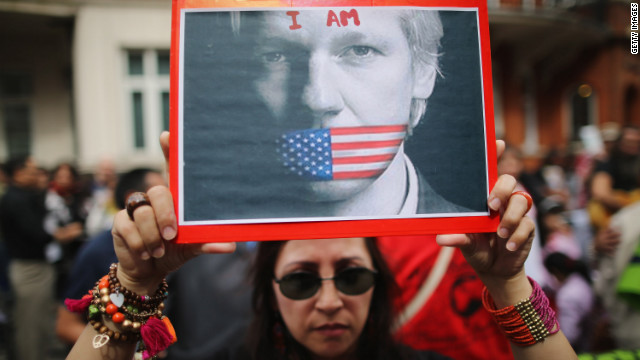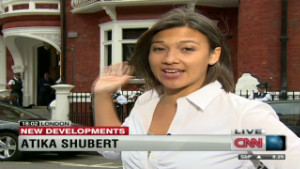
(CNN) -- Julian Assange was back in the news on Thursday because, after nearly two months of holding out in Ecuador's London embassy to avoid being extradited to Sweden, where he is wanted for questioning,

he has been granted "political asylum" by the Ecuadorean government. The decision has set off a diplomatic stand-off, with the UK government threatening to revoke the embassy's diplomatic status and Ecuador responding with anger.
There's something deeply ironic, and sad, about watching WikiLeaks' founder turn to a country with a terrible record on press freedom to avoid falling into the hands of another government, or governments, if you count the United States as the other major player in this melodrama. That's because the original promise of WikiLeaks was that as a "stateless" news organization, to use press critic Jay Rosen's phrase, living on the Internet, WikiLeaks might be able to escape the pressures nearly all media organizations must deal with from their local host countries.
In theory, WikiLeaks could have avoided this fate, but only if Julian Assange hadn't insisted on maintaining complete control of the organization even after his personal legal troubles emerged.
Standoff at embassy, after Ecuador grants asylum to WikiLeaks' Assange
Since August 20, 2010, when Swedish authorities issued an international warrant for Assange's arrest on suspicion of rape, sexual molestation and unlawful coercion (he has has denied the allegations), the transparency site has been in crisis. "We had ... conceived of ourselves as a neutral submission platform, pure technology, and not a political agitator with a Twitter account," writes Daniel Domscheit-Berg, Assange's one-time lieutenant, in his valuable book "Inside WikiLeaks:" "It was Julian who made the decisions. The rest of us were too indecisive and skittish or simply lacked the resolve to set any limits for him. Julian thus became the autocratic head of WL, accountable to no one and tolerating no challenges to his authority."

Micah Sifry
During a climactic online meeting on September 14, 2010, WikiLeaks' inner circle, which also included a mysterious master coder referred to as "the architect," met for what would be their last group conversation. Assange was angry about comments Jonsdottir had made to the Daily Beast: "I am not angry with Julian, but this is a situation that has clearly gotten out of hand," she told reporter Philip Shenon. "These personal matters should have nothing to do with WikiLeaks. I have strongly urged him to focus on the legalities that he's dealing with and let some other people carry the torch."
But Assange refused to back down, saying, essentially, "WikiLeaks, c'est moi." According to Domscheit-Berg's account, Jonsdottir responded, "So what you are saying Julian is that you are wl [sic] and everyone else just your servants who you allocate trust to."
Timeline: Julian Assange's extradition battle
There's a reason why it's hard to censor online speech. The Internet was designed to make it easy to move information to route around points of failure. And so, when WikiLeaks started publishing its seminal document dumps of the Afghanistan and Iraq war files, and then compounded that with its tempered release of the State Department cables, it was impossible to stop.
 Waiting for Assange to make a move
Waiting for Assange to make a move But as has become clear, WikiLeaks was not like the Internet it lives on: It also had a single, internal point of failure. When Assange stumbled in his personal life (and that's the most charitable way to put it), his response to the crisis broke the trust of his closest allies. Not only did Domscheit-Berg and Jonsdottir stop working with WikiLeaks, so did the "architect," who took the software that had enabled the site to safely receive anonymous leaks.
Since then, WikiLeaks has produced little beyond what hackers reportedly connected to Anonymous have given it: The Stratfor e-mail archive, which has proven to be of fairly little real value beyond illuminating some of the sleazier business practices of the private security industry, and most recently e-mails from inside the Syrian government. Last year, Assange burned what little moral capital he had left when he decided to post the full, unexpurgated State Department cable database, exposing innocent people to potential harm. It's a far cry from WikiLeaks' years of constant output of vital documents exposing corporate and governmental misconduct around the world.
To avoid potential extradition to Sweden and then, hypothetically from there to the United States, Assange is hoping to go to Ecuador, whose government has been friendly to his cause. But Ecuador itself is hardly a safe haven for press freedom. As the Washington Post recently reported:
"Press freedom advocates say that no other country in Latin America is moving so fast and on so many fronts to restrain the media as tiny, banana-producing Ecuador. President Rafael Correa, an American-educated leftist economist who has forged close alliances with Cuba and Iran, has filed a defamation lawsuit that might put the three directors of the country's largest newspaper in jail and shutter their 90-year-old paper. The government has cobbled together a framework of laws and constitutional revisions to limit press independence, free expression groups say, while building a media conglomerate to disparage critics and counter independent media reports."
There's no reason to believe that if WikiLeaks is based in Ecuador, it won't be subject to similar pressures.
Media circus descends on Assange embassy
The cause of transparency is far, far bigger than the legal troubles of one brilliant, courageous but ultimately flawed individual. Britain ought to let Assange flee to Ecuador, because there's little chance he can get a fair trial in either Sweden or the United States. But then let's be done with him. Those of us who want freedom of information to thrive should learn a key lesson from Assange's case. For information to flow freely, there can't be any single point of control.
This commentary is adapted from an essay that appeared on Techpresident.com

No comments:
Post a Comment